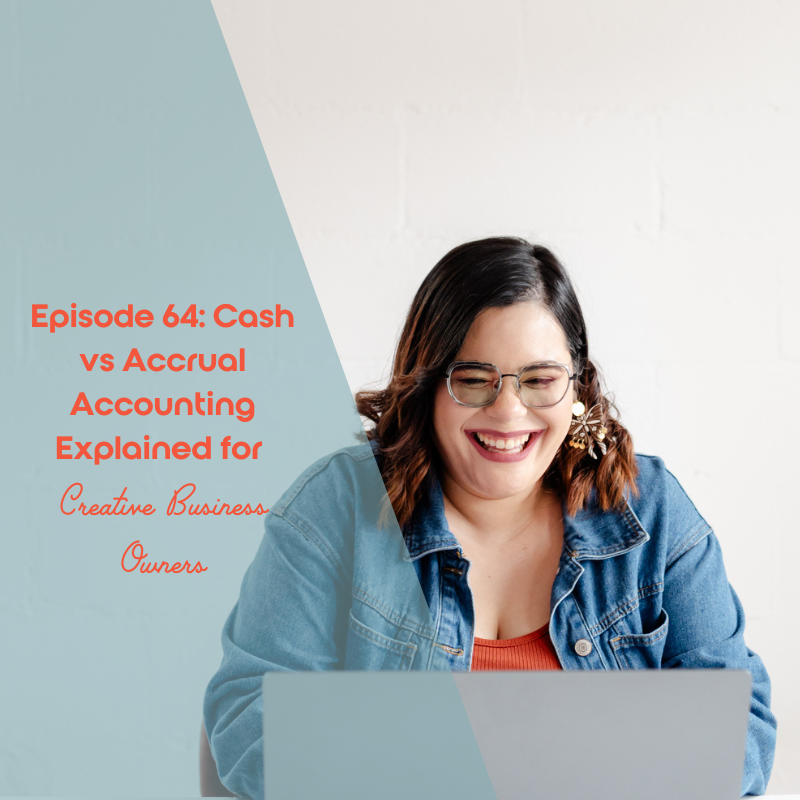When your profit report says one thing, but your bank balance says another, it’s easy to feel confused and frustrated.
In this episode, I break down one of the most misunderstood financial topics cash vs. accrual accounting so you can finally trust your numbers and know which method makes sense for your stage of business.
🎧 Listen to the Episode:
🎬 Watch the Episode:

What I Yapped About:
This episode is your no-fluff guide to understanding how cash and accrual accounting really work and what that means for your creative business. Here’s what I covered:
- The difference between cash and accrual accounting: Think of cash as “what’s in your wallet” and accrual as “what’s in your planner.” I explain why that matters for your financial reports.
- Pros and cons of each method: Cash basis is simple and great for small businesses, while accrual gives you deeper insight into performance and planning but comes with added complexity.
- Real-world examples: From client invoices to software subscriptions, I walk through scenarios so you can see exactly how each method plays out.
- How to know what’s right for you: Whether you’re just starting out or scaling toward bigger goals, I share guidance on when to stick with cash and when to consider accrual.
Your Next Step:
Take a look at your own bookkeeping setup this week and see which method you’re currently using.
If you’re not sure, open up your P&L report are sales showing up when invoices are sent, or only when payments clear the bank? That’s your clue.
Once you know, ask yourself if that method is giving you the clarity you need, or if it might be time to shift.
🎧 Listen to the full episode now, or if you can’t listen check out the transcript below.
Read the Transcript
📍 Welcome to the Creative Minds Smart Money Podcast, where we turn financial confusion into creative confidence. I’m Samantha Eck, bookkeeper and fractional CFO for creative entrepreneurs. Each week I’m sharing my financial expertise and actionable strategies to help you build a thriving creative business. Plus, you’ll hear from industry experts who bring fresh perspectives on growing your business beyond the numbers. Because building a successful creative business starts with strong financial foundations. Your next chapter starts now.
Welcome back to another episode of Creative Finds Smart Money, and today’s another topic I probably should have talked about a long time ago, but we’re gonna get into it anyways. It is cash versus accrual accounting, and you’re probably looking at me and saying, Samantha, that is way over my head. That is a finance term I’ve never understood.
I don’t get what you’re talking about. You’re crazy free from bringing it up, but I promise you it’ll make a whole lot more sense once we actually get into it. So it’s one of the most confusing financial topics out there, and it’s actually one of the most important if you actually wanna trust your numbers.
So when you make a 10 K sale, but your reports still say you lost money or you finally got paid, but your profit looks great before the cash hit. It’s a lot of frustration that is built from that. So I’m gonna get. Into this today and help you make sense of what cash versus accrual is, using some real word examples and then breaking down the pros and cons to help you choose what’s right for your business stage, and kind of like what’s right for you right now.
So right now, let’s talk about what the difference is. So on a cash basis, it means that you recognize your income when cash hits the bank. So if I were to pay you today and two days later, the cash paid hits the bank, that is cash basis. You’ve recognized that income, it comes in and you recognize expenses when you actually pay them.
So if you have. For example, you took something out on your credit card, that expense is actually paid. So it’s a simple rule, which means no money movement equals no entry. So for example, you invoice a client in June and they pay in July. It counts as July income. It’s not June income. Even though you invoice them in June, your order prints in June, but you pay the bill in August, it counts in August, it doesn’t count in June again.
So those kind of like differences there. With accrual basis, you recognize income when it’s earned regardless of the payment. Timing. So you could get paid in July, but not earn it until August. And then you also recognize expenses when they’re incurred, even if they are paid later. So if you sent out an invoice in June.
That’s June income, even if you get paid in July. So that invoice will show up on your June income. If you ordered supplies in June, that is a June expense, even if you pay it in August because you have something like accounts receivable, accounts payable. So to give you a little bit more of like an analogy and kind of like how you can think about this is cash is what’s happening in your wallet and accrual is what’s happening in your planner.
So let’s kind of come up with a visual example here. So let’s say you invoice $5,000 in June. That money in accrual example is going to come out in June. So on a cash basis, p and l, obviously if you get that money in July, it’s gonna count in July. But if it comes in a cash, in a cash basis, it’s gonna hit in June.
Even if your client pays you in July, it doesn’t matter because that money is technically earned in June. And then for your software expenses, if you billed in June, but you paid in July. As an accrual basis, that’s gonna count in June, but a cash basis, that’s gonna count in July. So when we think about this, and we look at this June income for our cash basis, p and l is gonna be zero income, zero expenses, zero profit.
Whereas an accrual basis is gonna be $5,000 income, $200, $200 expense, $400,800 profit, and then July again 0, 0, 0. So again, the point is that the cash basis is gonna tell you what’s in your account, but not necessarily what you’re actually making.
The accrual basis tells you what you earned and owe even if it hasn’t moved yet, even if the money’s kind of still sitting there. I know that sounds confusing. So we’re really gonna go into this, a little bit more and talk about it so that you can. Get more of a visibility and understanding of it.
So let’s talk about the pros and cons between the two of them. And let’s start with a cash basis. So first of all, it’s simple to understand and track and. Actually, a lot of my clients use cash basis when they’re very, very small. It matches your bank account to show you what’s actually there, and obviously it’s easier for small businesses with a really, really tight cash flow, but it can look misleading, like you’re broke when you’re not, or profitable when you’re overdrawn.
It doesn’t match when work is done versus when paid. And it can hide really big issues. For example, like a lot of un, lots of unpaid invoices, things like that. It can just cause a lot of really big. It’s a lot of really big issues. For the accrual basis, it gives you a clear picture of your performance over time, so we’re matching income and expenses to when they actually happen, which helps with forecast and goal tracking, and of course, decision making.
It does make it a little bit more complex. Because if it doesn’t match your bank balance, you might look profitable, but you could have $0 in cash. And then of course, with accrual, accrual is where you really kind of need that bookkeeping. That bookkeeping help because Accrual County becomes a lot more, I guess, interesting.
There’s a lot of different journals and things like that that need to be set up with accrual accounting.
Most small businesses can use cash basis for tax filing if they’re under $25 million in revenue.
So actually most of the businesses that I work with use cash basis because it’s just that much easier. They don’t need accrual. And they don’t have accounts for saveable and payable, they don’t pay on terms, they don’t , process on terms. They just wanna get the money when it hits their account.
If you carry inventory, you might be required to use accrual basis accounting. So you’ll have to look into kind of like the, the rules around that. ’cause it’s different per state. It’s also different, depending on what you’re selling. Accrual becomes required if you grow large enough, so it’s good to understand it really early and get, just a clear understanding of what’s going on with him.
So what do I recommend as a CFO and bookkeeper? If you’re early stage, you’re very small, you’re very cash conscious. I really do recommend doing cash basis. It’s a valid starting point and as long as you know what it’s not telling you, it’s it works. I recommend though, accrual, if you really want scaling and insight and you don’t just want to go with off of what’s just in your bank mouths, like if you want to understand it a little bit more, then I definitely recommend accrual basis and it’s gonna help you to just.
Again, have that forecast, have that profitability analysis. Everything like that is gonna be a lot easier when you have numbers that actually reflect in the months that they occurred instead of months later.
So I want you to understand as well that one isn’t better than the other. Accrual accounting isn’t better than cash accounting, of course. It’s about what you need your numbers to do for you. So you can run on cash accounting if you’re under 25 million. Like if you have a business that you’re only making two 50 KA year, you’re happy with that.
You’re like, I don’t wanna ever switch. Don’t. But if you’re like, I really need more clarity, insight, and understanding of the numbers, then switching to accrual isn’t a bad option. 📍 If you aren’t sure what you’re currently using or if you should switch, just again, message me on Instagram, to me an email, whatever it is, and let’s kind of talk about what it is that you’re currently doing and how we can transition if you want to.
As always, if you found this episode helpful, please leave a comment like it, subscribe, and of course share it on social media so that we can get more people like you to listen to the podcast. Otherwise, you guys, I wish you the best week ever and we’ll see you next week. Farewell fellow Travelers.
Listen to some more Finance Episodes:
- Episode 57: The Right Way to Reconcile Your Books
- Episode 58: Why CFO Strategy Isn’t Just for Big Businesses
- Episode 60: Master Cash Flow Forecasting for Creative Businesses
- Episode 61: Should You Hire an Employee or a Contractor for Your Business?
- Episode 62: How to Pay Employees the Right Way (and Avoid Costly Mistakes)
The Legal Stuff
© – All content on this page, including text and images, is the copyright of this blog unless otherwise stated. You’re welcome to share or repost for non-commercial purposes, but please credit the original source and include a link back to this page. Unauthorized use or reproduction for commercial purposes is strictly prohibited.
